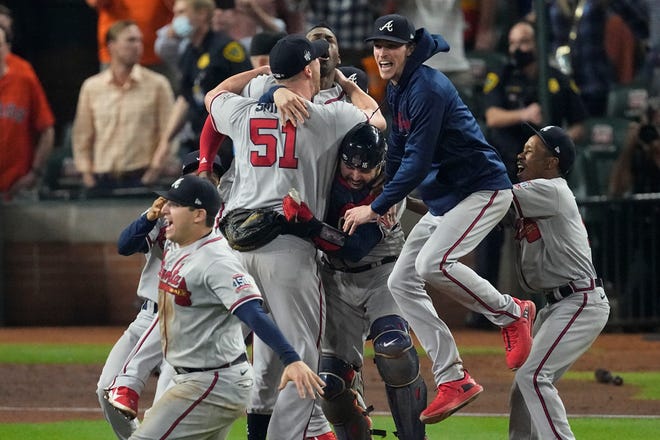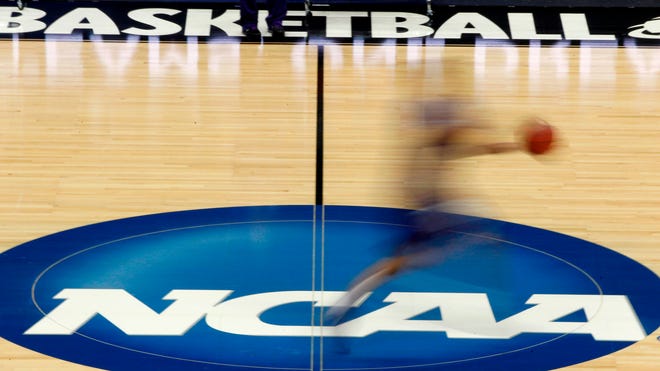
HOUSTON – In a baseball universe increasingly given over to the young, where managerial experience is no longer a prerequisite to run a dugout, the World Series champions are led by a 66-year-old organizational lifer, who was filling out lineup cards in remote depots of the Deep South four decades ago.
In a competitive landscape where win curves and playoff expectancy rule all, the best team in baseball couldn’t crack .500 by the All-Star break, lost its greatest player to injury – and then tripled down, wheeling and dealing for an entirely new set of outfielders.
And in a postseason in which they had to get through the market-defying Milwaukee Brewers, the big bucks and bigger brains of the Los Angeles Dodgers and the still-formidable, industry-disrupting Houston Astros, the champions of Major League Baseball reigned thanks to the decisions of a twice-recycled GM who eschews corporate speak and a top-to-bottom organizational mindset that values every voice.
Yes, these Atlanta Braves don’t look or sound or transact like so many of the 29 other franchises in the major leagues. And as they put the finishing touches on a 7-0 victory over the Astros in Game 6 of the World Series on Tuesday night, nailing down their first championship since 1995, that’s something for which many baseball fans can be grateful.

None moreso than their millions of supporters in greater Atlanta, who have waited not so patiently for a winner – any winner - since Tom Glavine and David Justice teamed up to beat Cleveland 1-0 in the 1995 Series, two stadiums and a different millennium ago.
Hard to believe, but Brian Snitker was both a Brave and in the house at Fulton-County Stadium that night. He spent ’95 as a roving minor league instructor, 13 years after he first filled out a lineup card for the 1982 Anderson (South Carolina) Braves, in low A-ball.
As Tuesday night turned to Wednesday morning at Minute Maid Park, Snitker, in his 47th year in the organization, but just his sixth at the helm of the big club had a special gift on its way.
“I’m going to give it to Brian,” first baseman and franchise anchor Freddie Freeman said of the baseball he cradled for the final out of Game 6, then tucked it in his back pocket, safe from the celebratory fray. “He means so much to this organization. He's put on every hat there is.”
Tuesday night, he added another one – 2021 World Series champions, and there’s no asterisks for how hard it was nor how doubtful it looked for so much of the summer.
No, we won’t be confusing these Braves with the ’27 Yankees or the ’98 Yankees or even the ’18 Red Sox. They won just 88 games, and only the 2006 Cardinals (83 wins), 2000 Yankees (87) and 1987 Twins (85) won fewer games and a World Series title over a full season in the divisional era.
Yet this is four consecutive National League East titles for the Braves, proof that their organizational foundation and individual fortitude renders their relatively light win total an aberration. Lest we forget, this season began with ace Mike Soroka re-injuring his Achilles’ heel and missing the season, a big reason the Braves were 41-44 and in fourth place on July 6.
It ended with veteran horse Charlie Morton breaking his fibula in Game 1 of the World Series.
And in the middle of this manure sandwich was the great Ronald Acuña Jr. suffering a torn ACL in July.
So many franchises might have cashed it in. But general manager Alex Anthopoulos is not wired that way, nor is the organization.
“Alex went ahead and said ‘No, we’re not sellers, we’re buyers,” reliever Tyler Matzek said after finishing a dominant postseason with a two-inning, four-strikeout performance.
“And he bought the right people, that’s for damn sure.”
One of them, outfielder Jorge Soler, seized the World Series MVP trophy in Game 6, clubbing a baseball 466 feet and over the Minute Maid Park train tracks – his third go-ahead home run of the Series. Another, Adam Duvall, slugged a Game 5 grand slam. Joc Pederson carried them past Milwaukee in the NL Division Series.
While the Braves are quietly proud of their work in the analytics space, another department seems just as crucial – human resources.
BRAVES WIN: Atlanta takes first World Series title since 1995
WORLD SERIES MVP:Midseason addition Jorge Soler slugs his way to award
"It is knowing the people in your organization understand what it is we want to accomplish, what the prize is, what the purpose is – and that is to build a championship team, with players who have championship hearts,” says Hall of Fame GM John Schuerholz, architect of the Braves’ dynasty of the 1990s and their last championship club.
“Alex did that and now we find ourselves World Series champions.”
Yet to give credit to yet another rock-star GM would be to miss the point of these Braves. Certainly, they have star power, from Freeman to Acuña to emerging slugger Austin Riley. Yet after Morton went down, the group was carried by a pitching staff that tasted failure far too recently.
Matzek remains one of the game’s great reclamation stories. Yet in this World Series, with the staff terribly compromised, it was A.J. Minter and Luke Jackson, Kyle Wright and Chris Martin all consuming crucial outs and holding the group together.
All shared another trait: Veteran pitchers forced to swallow their pride and spend time at Class AAA Gwinnett this season.
It was a true test of a pitcher’s resolve and also the organization’s brain power. Minter, for one, says he would not be here without Class AAA pitching coach Mike Maroth keeping his head right.
“Everyone should experience failure,” says Minter, who finished with 18 strikeouts in 12 postseason innings and pitched in six of the Braves’ 11 victories. “That’s what makes you who you are. What (Maroth) did for me, over two years, personally, goes unmatched.”
Erstwhile set-up man Chris Martin felt that pain, too. He found himself sliding way down the Braves’ bullpen pecking order, as Matzek and Minter and others rose. Martin was off the NLDS roster, forced to tinker with arm and mind at Gwinnett.
Come World Series time, he was on the roster, pressed into absorbing a crucial inning in a 3-2, Game 4 win in which opener Dylan Lee recorded just one out. He added another 1 ⅓ scoreless innings to help Atlanta crawl back into Game 5 – just 2 ⅔ innings that won’t make the championship highlight DVD, but are part of the connective tissue that makes a champion.
“They never give up on you. You can go through some struggles, but they keep throwing you out there and keep giving you confidence to do your job.
“I didn’t have the year that I wanted. But a lot of people stepped in and took on that role and did a great job.”
And all that comes back to the man in the dugout. Snitker admitted he saw parts of his career flashing before him during Game 6 – how could he not? – and that the entire evening felt “surreal.”
There is nothing Ivy League about Snitker, who has possibly never heard the term “life coach” or “wellness expert.”
Yet he’s no rube, either and the players know this and appreciate that the franchise looks beyond the surface.
“In an era when teams are signing new managers that are doing analytics and all this stuff,” says Matzek, “for a team to stick with a guy like Snit who brings a little bit of both – a little old school and new school – it’s a great blend of what today’s baseball is and old-school baseball. He’s been the rock in our locker room.
“That calmness, that never-wavering attitude – it starts with him.”
Snitker thought, too, about those who didn’t make it – lifers in other organizations who never made it off the busses, out of the complex, onto a charter flight.
His was a narrow path, but he survived, developing qualities he’d eventually pass on to his greatest ballclub.
“You just keep fighting the fight and grinding through because you never know what could happen,” Snitker said as Wednesday morning grew later. “It happened to me. I got an opportunity.
“There's a lot of guys out there, my same type thing who have been through a lot and put their families through a lot, and not everybody gets it. I was blessed enough to get an opportunity.”
The Braves chose him in the 25th round way back in 1976, and eventually the great Hank Aaron himself extended Snitker a job when he only batted .254 over four minor league seasons.
The Hammer saw the right qualities in Snitker and Schuerholz sees it, too, likening Snitker’s relationships with his coaches and the front office with his own partnership with manager Bobby Cox.
“His players see that,” says Schuerholz, “they feel it and they feel very comfortable with him as their manager because they know they can trust him. He’s been here 45 years. That’s a trustworthy man.
“And tonight, he proved that he’s a darn good manager that can win championships.”
Thanks in large part to an organization that never loses sight of that goal.
Source link








